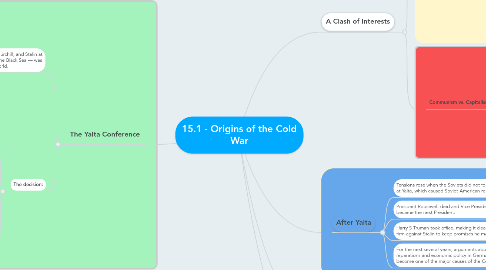
1. The Yalta Conference
1.1. A meeting of Roosevelt, Churchill, and Stalin at Yalta — a Soviet resort on the Black Sea — was held to plan the postwar world.
1.1.1. Although the conference went well, some agreements made would later become key in causing the Cold War.
1.1.2. FDR
1.1.2.1. Stalin
1.1.2.1.1. Churchill
1.2. The decision:
1.2.1. At Yalta, a compromise was made with Roosevelt and Churchill agreeing to recognize the Polish Communist government set up by the Soviets.
1.2.1.1. Stalin agreed that the government would include members from the old Polish government before the war.
1.2.1.2. Stalin agreed that free elections would take place in Poland.
1.2.2. During the meeting at Yalta, Roosevelt, Churchill, and Stalin issued the Declaration of Liberated Europe, giving people the right to choose their form of government.
1.2.3. It was decided at Yalta to divide Germany and Berlin into four zones, with Great Britain, the United States, the Soviet Union, and France each controlling a zone.
1.2.3.1. Germany
1.2.4. It was also agreed that Germany would pay reparations for damage caused by the war.
2. A Clash of Interests
2.1. After World War II, the United States and the Soviet Union became increasingly hostile, leading to an era of confrontation and competition that lasted from about 1946 to 1990 known as the Cold War.
2.1.1. AMERICAN CONCERNS:
2.1.1.1. Americans were concerned with economic problems.
2.1.1.2. Roosevelt and his advisers believed that economic growth would keep the world peaceful.
2.1.1.3. American leaders promoted a democracy with protections for individual rights and free enterprise to create prosperity.
2.1.2. SOVIET CONCERNS:
2.1.2.1. They were suspicious of capitalist countries because they felt capitalism would lead to war and eventually destroy communism.
2.1.2.2. Soviets believed communism was superior to capitalism.
2.1.2.3. They wanted all countries between Germany and the Soviet Union to be under Soviet control.
2.1.2.4. Soviets were concerned with security and wanted to avoid future attacks from Germany.
2.2. Communism vs. Capitalism
2.2.1. Capitalism
2.2.1.1. Prices set by supply and demand
2.2.1.2. Private ownership of property and enterprise
2.2.1.3. Limited intervention by government
2.2.2. Communism
2.2.2.1. Prices set by government
2.2.2.2. All property and enterprise owned by the state
2.2.2.3. Secret police limits freedom
3. After Yalta
3.1. Tensions rose when the Soviets did not follow agreements made at Yalta, which caused Soviet-American relations to deteriorate.
3.2. President Roosevelt died and Vice President Harry S Truman became the next President.
3.3. Harry S Truman took office, making it clear he would stand firm against Stalin to keep promises he made during Yalta.
3.4. For the next several years, arguments about these reparations and economic policy in Germany would become one of the major causes of the Cold War.
4. Potsdam Conference:
4.1. In July 1945, Truman and Stalin met at Potsdam near Berlin to work out a deal regarding Germany.
4.1.1. Truman was against heavy reparations on Germany, feeling that the reparations would not allow German industry to recover.
4.1.2. Agreements were made allowing the Soviets to take reparations from their zone in Germany and a small amount of German industrial equipment from other zones.
4.1.3. Stalin was not pleased with Truman’s proposal.
4.1.4. Truman then told Stalin of the successfully tested atomic bomb, leading Stalin to think it was a threat to get him to agree to the deal.
4.1.5. Stalin agreed, but tensions rose.
4.2. Other issues at Potsdam did not end successfully.
4.2.1. The Declaration of Liberation of Europe was not upheld, and the Soviet army’s presence led to pro-Soviet Communist governments being established in Poland, Romania, Bulgaria, Hungary, and Czechoslovakia.
4.2.1.1. These Communist countries of Eastern Europe became known as the satellite nations.
4.2.1.2. Although they had their own governments and were not directly under direct Soviet control, they had to remain Communist and follow Soviet-approved policies.
5. As Communists began taking over Eastern Europe, Winston Churchill’s term, the iron curtain, was used to describe the separation of the Communist nations of Eastern Europe from the West
5.1. Iron Curtain Speech
5.1.1. https://www.youtube.com/watch?v=GXoCduu9iNE
